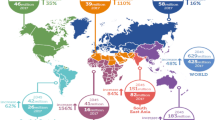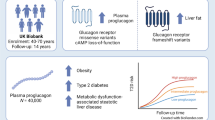Abstract
The K121Q polymorphism of the ectoenzyme nucleotide pyrophosphate phosphodiesterase 1 (ENPP1) gene has been variably associated with insulin resistance and type 2 diabetes (T2D) in several populations. However, this association has not been studied in Iranian subjects and we hypothesized that the K121Q variant might be associated with T2D and related metabolic traits in this population. The K121Q genotypes were determined by PCR-restriction fragment length polymorphism in 377 normoglycemic controls and 155 T2D patients. T2D patients had significantly higher values for systolic and diastolic blood pressure, BMI, glucose, cholesterol, triglyceride, LDL, apoB, insulin, and HOMA-IR, and lower levels of HDL than the normoglycemic subjects. The frequency of the Q allele did not differ between T2D and normoglycemic subjects (OR 0.96, 95% CI 0.90–2.00, P = 0.70). The Q allele frequency was 16.5% in T2D and 15.2% in normoglycemic subjects. The ENPP1 genotype (KQ + QQ) was not associated with the systolic and diastolic blood pressure, glucose, triglyceride, cholesterol, LDL-C and HDL-C, apo B, BMI, HOMA-IR, and insulin levels in both normoglycemic and T2D groups. Our results suggest that the ENPP1 121Q allele might not be associated with T2D and related metabolic traits among Iranian subjects.
Similar content being viewed by others
References
King H, Aubert RE, Herman WH (1998) Global burden of diabetes, 1995–2025. Diabetes Care 21:1414–1431
Meshkani R, Adeli K (2009) Hepatic insulin resistance, metabolic syndrome and cardiovascular disease. Clin Biochem 42:1331–1346
Meshkani R, Adeli K (2009) Mechanisms linking the metabolic syndrome and cardiovascular disease: role of hepatic insulin resistance. J Tehran Univ Heart Cent 2:77–84
Meshkani R, Taghikhani M, Larijani B, Khatami Sh, Khoshbin E, Adeli K (2006) The relationship between homeostasis model assessment and cardiovascular risk factors in Iranian subjects with normal fasting glucose and normal glucose tolerance. Clin Chim Acta 371:169–175
Hamman R (1992) Genetic and environmental determinants of non-insulin dependent diabetes mellitus (NIDDM). Diabetes Metab Res Rev 8:287–338
Maddux BA, Sbraccia P, Kumakura S, Sasson S, Youngren J, Fisher A et al (1995) Membrane glycoprotein PC-1 and insulin resistance in non-insulin-dependent Diabetes mellitus. Nature 373:448–451
Dong H, Maddux BA, Altomonte J, Meseck M, Accili D, Terkeltaub R et al (2005) Increased hepatic levels of the insulin receptor inhibitor, PC- 1/ENPP1, induce insulin resistance and glucose intolerance. Diabetes 54:367–372
Goding JW, Terkeltaub R, Maurice M, Deterre P, Sali A, Belli SI (1998) Ecto phosphodiesterase/pyrophosphatase of lymphocytes and non-lymphoid cells: structure and function of the PC-1 family. Immunol Rev 161:11–26
Funakoshi I, Kato H, Horie K, Yano T, Hori Y, Kobayashi H et al (1992) Molecular cloning of cDNAs for human fibroblast nucleotide pyrophosphatase. Arch Biochem Biophys 295:180–187
Frittitta L, Youngren J, Vigneri R, Maddux BA, Trischitta V, Goldfine ID (1996) PC-1 content in skeletal muscle of non-obese, non-diabetic subjects: relationship to insulin receptor tyrosine kinase and whole body insulin sensitivity. Diabetologia 39:1190–1195
Pizzuti A, Frittitta L, Argiolas A, Baratta R, Goldfine ID, Bozzali M et al (1999) A polymorphism (K121Q) of the human glycoprotein PC-1 gene coding region is strongly associated with insulin resistance. Diabetes 48:1881–1884
Gu HF, Almgren P, Lindholm E, Frittitta L, Pizzuti A, Trischitta V et al (2000) Association between the human glycoprotein PC-1 gene and elevated glucose and insulin levels in a paired-sibling analysis. Diabetes 49:1601–1603
Meyre D, Bouatia-Naji N, Tounian A, Samson C, Lecoeur C, Vatin V et al (2005) Variants of ENPP1 are associated with childhood and adult obesity and increase the risk of glucose intolerance and type 2 diabetes. Nat Genet 37:863–867
Costanzo BV, Trischitta V, Di Paola R, Spampinato D, Pizzuti A, Vigneri R et al (2001) The Q allele variant (GLN121) of membrane glycoprotein PC-1 interacts with the insulin receptor and inhibits insulin signaling more effectively than the common K allele variant (LYS121). Diabetes 50:831–836
Maddux BA, Chang YN, Accili D, McGuinness OP, Youngren JF, Goldfine ID (2006) (2001). Overexpression of the insulin receptor inhibitor PC-1/ENPP1 induces insulin resistance and hyperglycemia. Am J Physiol Endocrinol Metab 290:E746–E749
Meshkani R, Taghikhani M, Al-Kateb H, Larijani B, Khatami S, Sidiropoulos GK et al (2007) Polymorphisms within the protein tyrosine phosphatase 1B (PTPN1) gene promoter: functional characterization and association with type 2 diabetes and related metabolic traits. Clin Chem 53:1585–1592
Expert committee on the diagnosis and classification of Diabetes mellitus (1997) Report of the expert committee on the diagnosis and classification of Diabetes mellitus. Diabetes Care 20:1183–1197
Matthews D, Hosker J, Rudenski A, Naylor B, Treacher D, Turner R (1985) Homeostasis model assessment: insulin resistance and B-cell function from fasting plasma glucose and insulin concentrations in man. Diabetologia 28:412–419
Gauderman WJ (2002) Sample size requirements for matched case-control studies of gene-environment interaction. Stat Med 21:35–50
Hamaguchi K, Terao H, Kusuda Y, Yamashita T, Hazoury Bahles JA, Cruz LLM et al (2004) The PC-1 Q121 allele is exceptionally prevalent in the Dominican Republic and is associated with Type 2 Diabetes. J Clin Endocrinol Metab 89:1359–1364
Abate N, Chandalia M, Satija P, Adams-Huet B, Grundy SM, Sandeep S et al (2005) ENPP1/PC-1 K121Q polymorphism and genetic susceptibility to type 2 diabetes. Diabetes 54:1207–1213
Laukkanen O, Pihlajamaki J, Lindstrom J, Eriksson J, Valle TT, Hamalainen H et al (2004) Finnish diabetes prevention study group. Common polymorphism in the genes regulating the early insulin signaling pathway: effects on weight change and the conversion from impaired glucose tolerance to type 2 diabetes. The Finnish diabetes prevention study. Diabetologia 47:871–877
Bouhaha R, Meyre D, Abid Kamoun H, Ennafaa H, Vaillant E, Sassi R et al (2008) Effect of ENPP1/PC-1–K121Q and PPARg-Pro12Ala polymorphisms on the genetic susceptibility to T2D in the Tunisian population. Diabetes Res Clin Pract 81:278–283
Keshavarz P, Inoue H, Sakamoto Y, Kunika K, Tanahashi T, Nakamura N et al (2006) No evidence for association of the ENPP1 (PC-1) K121Q variant with risk of type 2 diabetes in a Japanese population. J Hum Genet 51:559–566
Rasmussen SK, Urhammer SA, Pizzuti A, Echwald SM, Ekstrom CT, Hansen L et al (2000) The K121Q variant of the human PC-1 gene is not associated with insulin resistance or type 2 diabetes among Danish Caucasians. Diabetes 49:1608–1611
Hegele RA, Harris SB, Zinman B, Hanley AJ, Cao H (2001) Absence of association of type 2 diabetes with CAPN 10 and PC-1 polymorphisms in Oji-Cree. Diabetes Care 24:1498–1499
Grarup N, Urhammer SA, EK J, Albrechtsen A, Glumer C, Borch-Johnsen K et al (2006) Studies of the relationship between the ENPP1 K121Q polymorphism and type 2 diabetes, insulin resistance and obesity in 7, 333 Danish white subjects. Diabetologia 49:2097–2104
Miao-Pei C, Fu-Mei C, Dao-Ming C, Jack C-R T, Han-Fen H, Shyi-Jang S et al (2006) ENPP1 K121Q polymorphism is not related to type 2 diabetes mellitus, features of metabolic syndrome, and diabetic cardiovascular complications in a Chinese population. Rev Diabet Stud 3:21–30
Hyun-Ju S, Soo-Geun K, Oh-Joong K (2008) The K121Q polymorphism in ENPP1 (PC-1) is not associated with type 2 diabetes or obesity in Korean male workers. J Korean Med Sci 23:459–464
Weedon MN, Shields B, Hitman G, Walker M, McCarthy MI, Hattersley AT et al (2006) No evidence of association of ENPP1 variants with type 2 diabetes or obesity in a study of 8, 089 U.K. Caucasians. Diabetes 55:3175–3179
Bacci S, Ludovico O, Prudente S, Zhang YY, Di Paola R, Mangiacotti D et al (2005) The K121Q polymorphism of the ENPP1/PC-1 gene is associated with insulin resistance/atherogenic phenotypes, including earlier onset of type 2 diabetes and myocardial infarction. Diabetes 54:3021–3025
McAteer JB, Prudente S, Bacci S, Lyon HN, Hirschhorn JN, Trischitta V et al (2008) ENPP1 Consortium. The ENPP1 K121Q polymorphism is associated with type 2 diabetes in European populations: evidence from an updated meta-analysis in 42,042 subjects. Diabetes 57:1125–1130
Kubaszek A, Pihlajamaki J, Karhapaa P, Vauhkonen I, Laakso M (2003) The K121Q polymorphism of the PC-1 gene is associated with insulin resistance but not with dyslipidemia. Diabetes Care 26:464–467
Frittitta L, Baratta R, Spampinato D, Di Paola R, Pizzuti A, Vigneri R et al (2001) The Q121 PC-1 variant and obesity have additive and independent effects in causing insulin resistance. J Clin Endocrinol Metab 86:5888–5891
Abate N, Carulli L, Cabo-Chan A, Chandalia M, Snell PG, Grundy SM (2003) Genetic polymorphism PC-1 K121Q and ethnic susceptibility to insulin resistance. J Clin Endocrinol Metab 88:5927–5934
Meshkani R, Taghikhani M, Mosapour A, Larijani B, Khatami Sh, Khoshbin E et al (2007) 1484insG polymorphism of the PTPN1 gene is associated with insulin resistance in an Iranian population. Arch Med Res 38:556–562
Horikoshi M, Hara K, Ito C, Shojima N, Nagai R, Ueki K et al (2007) Variations in the HHEX gene are associated with increased risk of T2D in the Japanese population. Diabetologia 50:2461–2466
Gonzáles-Sánchez JL, Martínez-Larrad MT, Femández-Pérez C, Kubaszek A, Laakso M, Serrano-Rios M (2003) K121Q PC-1 gene polymorphism is not associated with insulin resistance in a Spanish population. Obes Res 11:603–605
Chandali M, Grundy SM, Adamd-Huet B, Abate N (2007) Ethnic difference in the frequency of ENPP1/PC1 121Q genetic variant in the Dallas Heart study cohort. J Diabetes Complicat 21:143–148
Ferrannini E, DeFronzo RA, Bonadonna RC (1992) Pathogenesis of NIDDM: a balanced overview. Diabetes Care 15:318–368
Author information
Authors and Affiliations
Corresponding author
Rights and permissions
About this article
Cite this article
Saberi, H., Mohammadtaghvaei, N., Gulkho, S. et al. The ENPP1 K121Q polymorphism is not associated with type 2 diabetes and related metabolic traits in an Iranian population. Mol Cell Biochem 350, 113–118 (2011). https://doi.org/10.1007/s11010-010-0687-z
Received:
Accepted:
Published:
Issue Date:
DOI: https://doi.org/10.1007/s11010-010-0687-z




